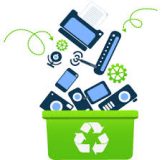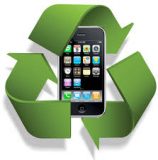Rapid changes in technology mean we’re constantly replacing computers, printers, cell phones, video game consoles and other electronic devices. All that obsolete equipment piles up. In fact, the United States generates 1.5 billion pounds of e-waste a year, or more than 171,000 pounds an hour. So, what to do with your old computer? Don’t trash it – donate it! There are plenty of organizations that take in this type of “outdated” equipment, and then refurbish it for reuse in schools and communities. One of our favorite organizations that is doing great things with this is the new arm of Network Liquidators – www.ecycling.com.
Your used computer can actually end up doing more than you’ve ever imagined – serving as an educational vehicle AND then a computer for someone! Please visit their website for more information, or simply google your city name along with ”˜donating used computers’ or ”˜donating computers to charity’ to find an organization like this in your area. Many electronics manufacturers and retailers also run their own recycling programs and The Launch Pad now has a partnership with eCycling to help our clients find homes for used equipment. Also, many retailers are taking the initiative to be good product stewards and to educate their customers about recycling. Find a list of e-cycling partners, including Best Buy, Staples, Sprint and more, at epa.gov/e-cycling.
After finding a good home for your obsolete electronics, rest easy knowing that you’ve saved the world from a few pounds of e-waste.
Scrub It Clean
Before donating or recycling your old computer, make sure your hard drive is completely data-free to guard against identity theft. “The one thing hard drives do really well is hang on to data,” says Billy Rudock, a tech support engineer with hard-drive maker Seagate Technology. “Unless the files are completely erased by overwriting the hard drive, the original data will always be there.”
Tom Merritt, executive editor at cnet.com, recommends Darik’s Boot and Nuke program, a free download that wipes the hard drive to Defense Department standards. “It takes awhile, so let it run overnight,” Merritt says. “If you don’t want to do it yourself, The Launch Pad can do it for you for around $20–$50 per drive. While some recyclers alos will scrub or destroy the drive and certify that the data is erased, but Anne Reichman, program director, earth911.org, says it’s safer to do it yourself. Another piece of good news; donated computers can be used as tax write-off which can help offset the cost of new technology.



